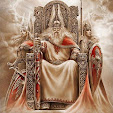Baucis and Philemon were an old married couple in the region of Tyana, which Ovid places in Phrygia, and the only ones in their town to welcome disguised gods Zeus and Hermes (in Roman mythology, Jupiter and Mercury respectively), thus embodying the pious exercise of hospitality, the ritualized guest-friendship termed xenia, or theosenia when a god was involved.
Zeus and Hermes came disguised as ordinary peasants, and began asking the people of the town for a place to sleep that night. They were rejected by all before they came to Baucis and Philemon´s simple rustic cottage. Though the couple were poor, their generosity far surpassed that of their rich neighbours, at whose homes the gods found "all the doors bolted and no word of kindness given, so wicked were the people of that land."
After serving the two guest food and wine, Baucis noticed that, although she had refilled her guest´s beechwood cups many times, the pitcher was still full. Realising that her guests were gods, she and her husband "raised their hands in supplication and implored indulgence for their simple home and fare." Philemon thought of catching and killing the goose that guarded their house and making it into a meal, but when he went to do so, it ran to safety in Zeu´s lap.
Zeus said they need not slay the goose and that they should leave the town. This was because he was going to destroy the town and all those who had turned them away and not provided due hospitality. He told Baucis and Philemon to climb the mountain with him and Hermes, not to turn back until they reached the top.













